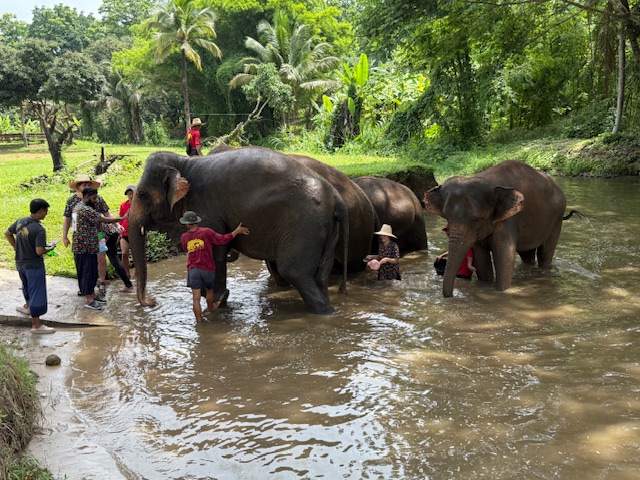CHIANG MAI – Among Thailand’s many natural wonders and cultural experiences, a visit to one of the country’s numerous elephant sanctuaries has become an increasingly popular activity for tourists.
Across the country, there are approximately 70 elephant care centers, with over 50 located in Northern Thailand alone. Of these, 9 to 12 facilities and clinics are concentrated in Chiang Mai Province, including well-known names such as Elephant Nature Park, Elephant Jungle Sanctuary, Patara Elephant Farm, Maerim Sanctuary, Hug Elephant Sanctuary, Kanta Elephant Sanctuary, Elephant Retirement Park, and Elephant Rescue Park.
Many of these sanctuaries operate as rescue, care, or rehabilitation centers for elephants that were previously used in logging, tourism, or entertainment—or suffered abuse and neglect. Their programs range from non-intrusive observation to interactive experiences, such as feeding, bathing, or even wellness activities tailored for the animals.
A Close Encouter with Elephants
In a recent visit to Kanta Elephant Sanctuary, ASEAN Today was given a detailed introduction to the lives and personalities of the resident elephants before being guided to the specially designated feeding area. As with all visitors, the experience began with an informative briefing to promote awareness of elephant welfare and the ethical principles guiding the sanctuary’s operations.
Elephants are naturally social herd animals, typically led by a matriarch, an older, experienced female who guides the group. However, a common challenge in sanctuaries is that many elephants arrive as individuals, not belonging to a natural family unit. As a result, they often struggle to form close bonds with one another.
To address this, sanctuaries assign each elephant a dedicated human caretaker, or mahout, who assumes the role of a surrogate family member. These mahouts care for the elephants around the clock, monitoring their well-being and helping to prevent conflict between individuals—ensuring a harmonious environment where the elephants can live in peace and safety.
In this way, Thailand’s elephant sanctuaries not only offer a memorable experience for visitors, but also play a crucial role in animal welfare, education, and responsible tourism.
Kanta Elephant Sanctuary: A Haven for Retired Working Elephants
Nestled in the serene landscapes of Northern Thailand, the Kanta Elephant Sanctuary serves as a peaceful refuge for elephants rescued from lives of labor and exploitation. Located about an hour’s drive from Chiang Mai, the sanctuary was founded with the goal of providing a safe, ethical, and nurturing environment for elephants who once worked in the logging, tourism, or entertainment industries.
A Sanctuary with Purpose and Compassion
Established in response to growing concerns over the mistreatment of elephants in Thailand’s tourism sector, Kanta Elephant Sanctuary was created as a retirement home for these gentle giants. Many of the elephants that arrive at Kanta have spent years in harsh conditions — carrying tourists on treks, performing in shows, or hauling logs — often enduring physical strain and emotional trauma.
Unlike traditional elephant camps, Kanta does not support elephant riding, shows, or forced interactions. Instead, the sanctuary promotes ethical and sustainable tourism, where visitors can observe and engage with elephants in ways that prioritize the animals’ well-being. Guests are encouraged to feed, walk alongside, and bathe the elephants — always under careful supervision and on the animals’ terms.
The Role of Humans in Rehabilitation
Elephants, especially those who have endured years of labor and poor treatment, often cannot survive on their own in the wild. They require human care for feeding, medical treatment, and psychological rehabilitation. At Kanta, a dedicated team of mahouts (elephant caretakers) and veterinarians ensures each elephant receives the care and attention they need to recover and live out their lives in peace.
The sanctuary also plays an educational role, raising awareness among visitors and the wider public about elephant welfare, the consequences of unethical tourism practices, and the importance of conservation.
A Second Chance at Life
Through Kanta Elephant Sanctuary’s compassionate approach, former working elephants are given a second chance — to roam freely, form social bonds, and simply be elephants again. The sanctuary exemplifies how responsible tourism and wildlife care can go hand in hand, offering not just a haven for the animals, but also a powerful message of empathy and coexistence. (hz) – Photos: AT/hz



